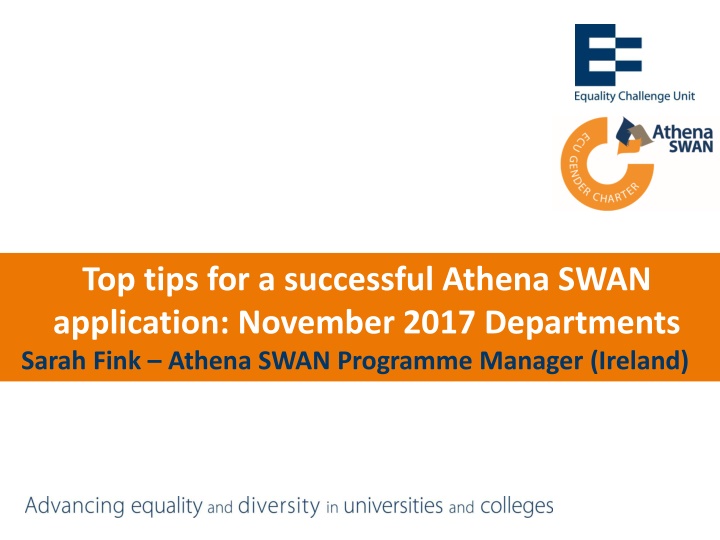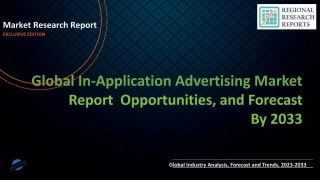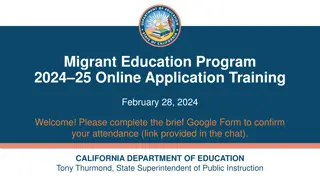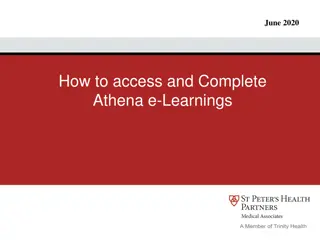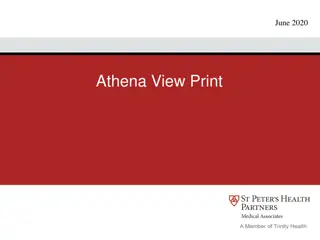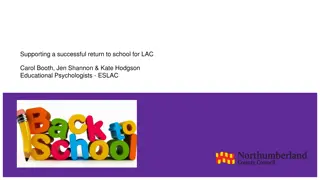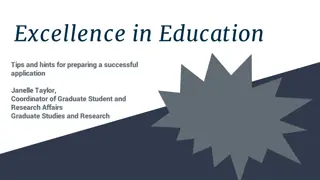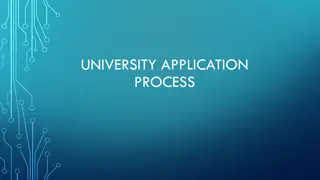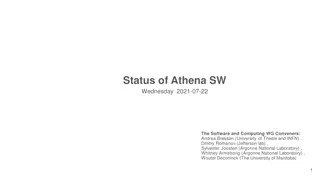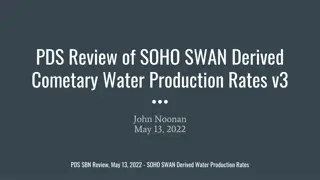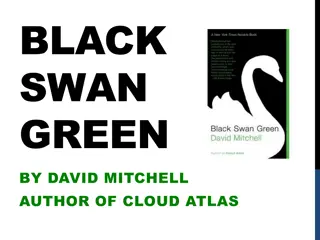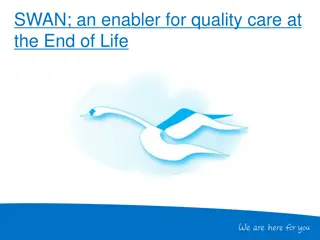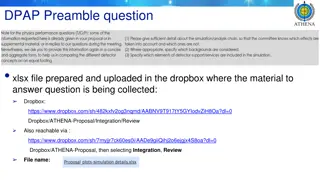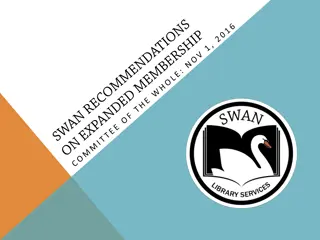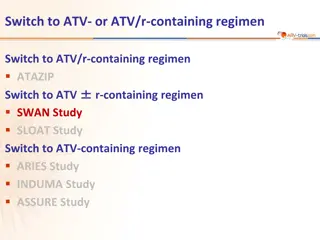Top Tips for Successful Athena SWAN Application
"Learn valuable advice from Sarah Fink, Athena SWAN Programme Manager, on how to ensure success in your application. Discover essential strategies and insights for enhancing your chances of approval. Benefit from expert guidance to improve your approach and increase your competitiveness within the Athena SWAN program."
Download Presentation

Please find below an Image/Link to download the presentation.
The content on the website is provided AS IS for your information and personal use only. It may not be sold, licensed, or shared on other websites without obtaining consent from the author.If you encounter any issues during the download, it is possible that the publisher has removed the file from their server.
You are allowed to download the files provided on this website for personal or commercial use, subject to the condition that they are used lawfully. All files are the property of their respective owners.
The content on the website is provided AS IS for your information and personal use only. It may not be sold, licensed, or shared on other websites without obtaining consent from the author.
E N D
Presentation Transcript
Top tips for a successful Athena SWAN application: November 2017 Departments Sarah Fink Athena SWAN Programme Manager (Ireland)
Workshop Agenda 1. Introductions 2. Award criteria 3. Checklist (beyond the questions) 4. SMART action planning and group discussion
Updated Athena SWAN principles 1. Recognise talents of all 2. Advance gender equality 3. Recognise disciplinary differences 4. Tackle the gender pay gap 5. Remove obstacles 6. Address short-term contracts 7. Tackle discrimination against trans people 8. Demonstrate senior commitment 9. Make structural and cultural changes 10.Consider intersectionality
Award criteria remain the same Bronze Silver Gold A thorough self-assessment using qualitative and quantitative analysis Identify key issues Actions in place to address key issues and carry the department forward Demonstrates the impact of previous activity Serves as a beacon in the discipline, sector and beyond
Why does Athena SWAN work? = Athena SWAN framework requires you to: 1. Collect data (quantitative and qualitative) 2. Critically analyse data 3. Identify reasons for exclusion and under-representation 4. Develop a 3 year action plan to address these 5. Show progress over time = individualised approach; not a box-ticking exercise Data Analysis Action
Across the entire application Have clear gender equality priorities When you are directly asked for data, provide 3 years Include specific data from staff consultation, disaggregated by gender Link each issue to action(s) directly related to why that issue exists Don t just describe institutional activity consider how the department supports or experiences policies and practices
Letter of endorsement Demonstrate commitment of the HoD, discuss how Athena SWAN is valued (time, money, recognition) Discuss specific challenges and actions for the future Link to strategy of department Be candid and honest Mention if you chair the SAT or are responsible for any actions
The self-assessment process Include specific details from staff and student consultation (who, what, when, response rates) Detail role on the SAT to show how work is shared Member Jane Greene Job SAT role Experience Senior Lecturer (employed since 2005) - Survey analysis - Focus group lead - Promoted (2010) - Works part-time (0.7 FTE) ECU s updated SAT guidance: http://www.ecu.ac.uk/wp-content/uploads/2014/06/SAT- Guidance-July-2017-PDF.pdf
Instead of this think like a panellist The extensive and engaging self-assessment process was achieved through collaboration across the department, made possible by the commitment, drive and vision of staff participating in the Self-Assessment Team (SAT) structures and consultation process. This in turn was enabled by the Athena SWAN awareness raising activities and other equality related work carried out prior to the establishment of the formal SAT structure. Significant preparatory work went into raising and building capacity for the initiative internally, prior to putting formal project structures in place.
Provide this think like a panellist To raise awareness and build capacity for the initiative internally, prior to putting a formal self- assessment team together: = All-staff emails were sent from the departmental SAT lead to raise awareness of, and signal senior commitment to, Athena SWAN = Workload allocations (64 hours) were made for three Athena SWAN Champions to visit an award holding institution, attend regional network meetings, and observe a panel assessment = Athena SWAN introductory seminar was held and included a town hall with the departmental SAT lead during core hours (28 attendees, 68% women)
A picture of the department Benchmark externally with your discipline (or similar) for student data and staff pipeline Identify leaks in the pipeline, reflect on why they exist and link to actions Disaggregate by course/specialism where appropriate
Key career transition points and career development Ensure you are reflecting on staff awareness of, take-up (even of mandatory activity and feedback on particular initiatives (by gender) this will help ensure your application is analytical rather than descriptive
Flexible working and managing career breaks Reflect on both informal and formal supports Ensure you are reflecting on staff awareness of, take-up and feedback on particular initiatives (by gender) If you are applying on the expanded process, present PSS separately
Instead of this think like a panellist Our high maternity return rate shows that leavers are well supported in the department.
Provide this think like a panellist Following feedback from the Parents Network, we ran a targeted survey in 2014 (60 responses) looking at the quality of service received by staff going on maternity leave. 33% reported no support prior to maternity leave; 75% reported no support during maternity leave; and 30% reported no support on their return.
Organisation and culture Provide 3 years of committee data Use feedback from consultation to provide a picture of departmental culture Include PSS staff if applying on the expanded form This is a common section where panellists look for proactive actions rather than further research
Using data to tell a story Successful applications: = Give a clear description of methods = Present data clearly = Demonstrate an in-depth analysis = Show honesty & self-reflection Unsuccessful applications: = Omit data = Mask issues = Describe, rather than reflect = Lack relevant, gender-specific analysis
Identifying issues Women are less likely to apply for promotion = Some women have not been encouraged to apply is this widespread? = Research is the primary driver of success is this built into the criteria, i.e. is this a perception, or a process problem? = Appraisal is rated less helpful by women could they be encouraged to apply for promotion? = Women are less likely to agree that the full breadth of their role is recognised is this keeping them from applying?
Identifying issues Women are less likely to be successful for promotion = Research is the primary driver of success are women being supported to undertake research? = Appraisal is rated less helpful by women is planning for career progression discussed? = Women are less likely to agree that the full breadth of their role is recognised is this keeping them from being successful? = Teaching is praised and encouraged is it being recognised at promotion?
SMART action: appraisal Action Rationale Timescale Responsible Success Measure Introduce an appraisal checklist, mandating discussion of career development and actively encouraging promotion applications Appraisal is rated as less helpful by female staff [baseline%] Checklist approved by HoD April 2018 Julia D. to draft checklist Appraisal is rated as helpful by >90% of staff, regardless of gender HoD to approve checklist Checklist circulated to line managers and published in staff handbook May 2018 Some staff have not been encouraged to apply for promotion Increase in the proportion of women applying for promotion from X% to >Y% Line managers to use checklist HoD to be accountable for this Women are less likely to apply for promotion [baseline%] Checklist used in all appraisal meetings from May 2018
SMART action: promotion Action Rationale Timescale Responsible Success Measure Clarify promotions criteria re teaching and knowledge exchange pathways Review staff handbook and make criteria clearer Publish case studies of staff who have been promoted, showcasing different pathways Run promotions workshop Women are less likely to agree that the full breadth of their role is recognised [baseline%] Handbook reviewed and updated Feb 2018 Mark T. to review handbook in collaboration with HR >90% of staff, regardless of gender, agree that the full breadth of their role is recognised Updated handbook circulated to all staff March 2018 Shivani B. to commission case studies from previous applicants and upload to departmental website Research is seen as the primary driver for success Increase in the proportion of women applying for promotion from X% to >Y% Case studies published March 2018 Women are less likely to apply for promotion [baseline%] Increase in the proportion of women successful at promotion from X% to >Y% Promotions workshop run in April 2018 and every spring term annually thereafter HoD to deliver promotion workshop Women are less likely to be successful for promotion [baseline%]
Progress vs Impact It s not about having done your action, but about the effect that your activity has had on gender equality and the culture of your department: = You run an annual promotions workshop, which after a year has 100% staff attendance Progress = As a result of these workshops, promotion success rate for women has increased Impact Progress = Bronze renewal Impact = Silver
Measuring your progress Staff/student numbers Representation and influence Survey data (or qualitative data) = Know and understand your baselines = Consult with staff and students from the beginning = Be clear from the start what you are trying to achieve = Check-in regularly 26
Athena SWAN: Defining action Successful applications: = Assign responsibility = Reflect accountability = Consider gender specific data = Set KPIs Unsuccessful applications: = Copy other generic Action Plans = Are passive = Present broad actions as one large activity = Shy away from setting targets
Group discussion Is the action specific? Could someone from another department read it and know what you are talking about? Does it have a clear rationale tied to an issue/data in the application? Who is responsible for implementing the action? Accountable for making sure it happens? Are there clear start and end dates, and milestones? How do you know its worth doing? (It isn t just about completing actions!)
